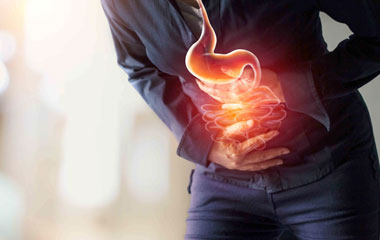What is a Gastritis?
DEFINITION: Inflammation of the lining of the stomach.
TYPES: ACUTE AND CHRONIC
SYMPTOMS
In people who have gastritis symptoms, pain or discomfort in the upper abdomen is the most common.
- The pain is usually in the upper central portion of the abdomen (the "pit" of the stomach).
- Gastritis pain occurs in the left upper portion of the abdomen and in the back. The pain seems to "go right straight through" a person as it travels from the belly to the back.
- People often use the terms burning, aching, gnawing, or sore to describe the pain. Usually, a vague sense of discomfort is present, but the pain may be sharp, stabbing, or cutting.
Other symptoms of gastritis include the following:
- Belching
- Nausea and vomiting
- Bloating
- Feeling of fullness or burning in the upper part of the belly
GASTRITIS CAUSES
Gastritis is associated with various medications, medical and surgical conditions, physical stresses, social habits, chemicals, and infections. Some of the more common causes of gastritis are listed here.
Medications (only the most common medications are listed)
- Aspirin (more than 300 drug products contain some form of aspirin)
- Nonsteroidal anti-inflammatory drugs (NSAIDs, such as ibuprofen or naproxen)
- Prescription steroids (for example, prednisone
- Potassium supplements
- Iron tablets
- Cancer chemotherapy medications
Swallowing chemicals or objects
- Corrosives (acid or dye)
- Swallowed foreign bodies (paper clips or pins)
Medical and surgical conditions
- People who are critically ill or injured develop gastritis.
- After medical procedures (such as endoscopy, in which a specialist looks into the stomach with a small lighted tube)
- After an operation to remove a part of the stomach
- After radiation treatment for cancer
- Autoimmune diseases
- Pernicious anemia
- Chronic vomiting
Infections
- Tuberculosis
- Syphilis
- Bacterial infections: H pylori infection is the most common. Many other bacteria-even those that usually cause pneumonia or bladder infection can cause gastritis.
- Viral infections
- Fungal (yeast) infections
- Parasites and worms
Other Causes
- Stress
- Alcohol consumption
- Smoking
GASTRITIS DIAGNOSIS
The diagnosis of gastritis can be established by a complete history and physical or in some cases may include blood tests and other tests (endoscopy) or consultation with a specialist (usually a gastroenterologist).
Laboratory testing:
The following tests are most likely to be ordered:
- Upper gastro esophageal endoscopy
- H. Pylori test
- Blood cell counts (looking mostly for anemia, a low blood count)
- Liver and kidney functions
- Urinalysis
- Gallbladder and pancreas functions
- Pregnancy test
- Stool test to check for blood
X-rays films or other diagnostic images may be ordered, although they are usually not necessary.
An electrocardiogram (ECG, EKG).
TREATMENT
The safest treatment is to avoid substances that trigger gastritis symptoms.
- Almost all health care practitioners would recommend this as the first step in preventing gastritis.
- First, the patient has to identify the triggers of gastritis.
Common avoidable triggers of gastritis symptoms include the following:
- Certain medications and chemicals
- Cigarette smoking
- Alcohol
- Coffee and other beverages that contain caffeine, such as cola and tea
GASTRITIS PROGNOSIS
Most people recover from gastritis. Depending on the many factors that affect the stomach lining, gastritis symptoms may flare-up from time to time. Overall, gastritis is generally a common, mildly troubling ailment that responds well to simple treatments.
